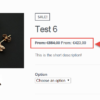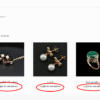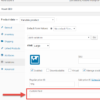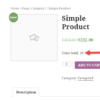
If you’re running an ecommerce site and haven’t spent any time thinking about the product recommendation experience your customers are having, then it’s incumbent on you to start doing so immediately.
Just think where Amazon would be without its robust recommendation engine. Certainly not where it is today.
You might not be able to make recommendations as precise as those of Amazon (that’s almost a certainty when you lack access to the mountains of data Amazon is harvesting to make ever-relevant suggestions), but you might as well work with what you have.
What you have, after all, as a merchant using the WooCommerce platform, is the fruits of countless hours of labor spent on all manner of tools and plugins, including those focused on (no surprise!) product recommendations.
Product recommendations can come in many forms. There is upselling, which involves attempting to sell a product that is more expensive than that being purchased; there is downselling, which involves attempting to sell a product that is cheaper than that being purchased; and there is cross-selling, which involves attempting to sell a product around the same price as that being purchased.
Upsells, downsells, and cross-sells typically take place during the checkout or post-checkout process. It is assumed that one or more items are already in the cart by the time the product recommendation is made. To be sure, there are many plugins that perform this sort of function, most famously CartFlows. However, in this blogpost, we are not so concerned with these kinds of product recommendation tools. Instead, we will focus our attention on those plugins that let merchants make recommendations on product and cart pages, regardless of whether the shopper has loaded the cart with anything.
1. Related Products for WooCommerce
The strongest contender for the crown is Related Products for WooCommerce, which flawlessly fulfills the role its name implies. This plugin, free and simple to install and configure, lets you enable appealing product sliders for product and cart pages as well as posts and sidebar widgets. The product slider will display randomly ordered products based on the attributes, categories, and tags you have selected. You can also opt for displaying this random assortment of products without a slider or you can keep things simple by showing a single related product. Related Products for WooCommerce takes the cake because it is one of those plugins that never fails to bring a smile on our faces, elegant in its simplicity and unerring in the execution of its intended function.
2. Product Recommendations
Upsells, downsells, cross-sells too, but most importantly, for our purposes, recommendations on product and cart pages. In fact, this plugin lets you deploy recommendations on 20+ locations across your store. Not stopping there, its rule-based product recommendation strategies and in-depth analytics are buttressed by machine learning, which is all the rage these days. Do note, however, that for machine learning to bear fruit, you need a solid training set, which is contingent on lots of data, meaning lots of purchases and lots of customers. The higher your gross merchandise volume, the more likely you are to benefit from this plugin. This plugin is ahead of its time and the only thing stopping it from taking home the gold is that it’s a premium plugin (we denizens of WooCommerce are a miserly crowd).
3. Related Products for WooCommerce
No, this is not a duplicate entry, it’s just that the creative energies of plugin developers do not usually extend to naming things. I am sure the prolific WebToffee, the company behind this plugin and 20+ others available on the WordPress repository, would not disagree. This plugin does exactly what you need it to do, but it does not let you globally display related products by attributes. You can, however, set individual product settings, which override global settings. Furthermore, you can control the number of products appearing concurrently in the slider and decide how products should be ordered (by title, date, name, random, and last modified).
4. Booster for WooCommerce
Here’s one you may have heard of before. Booster for WooCommerce is a jack-of-all-trades, an exhaustive plugin with 110+ features distributed between a wide range of modules. One such module lets you automate related products based on attributes, categories, and tags. Additionally, if Cartflows isn’t your cup of tea, you can use Booster to configure upsells, downsells, and cross-sells instead. All things considered, this workhorse of a plugin gets the job done despite its comprehensive scope. And there’s always Booster Plus, which is not necessary for the aforementioned features but essential to creating a top-of-the-line WooCommerce shopping experience.
5. Beeketing for WooCommerce
Another all-in-one plugin, although not so sweeping as the last one, Beeketing ably performs the role of product recommendation automaton. This is part and parcel of its mission to automate the marketing function for you with 10+ features engineered to boost sales. We’re not huge fans of the “fake” orders and countdown clocks, and it’s a shame the plugin doesn’t extend recommendations to product pages, but it lets you do quite a bit with the product carousels you can display on the cart page.





